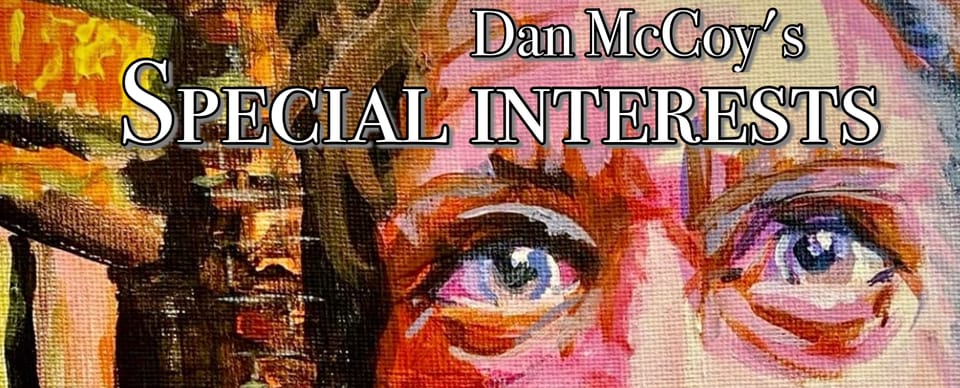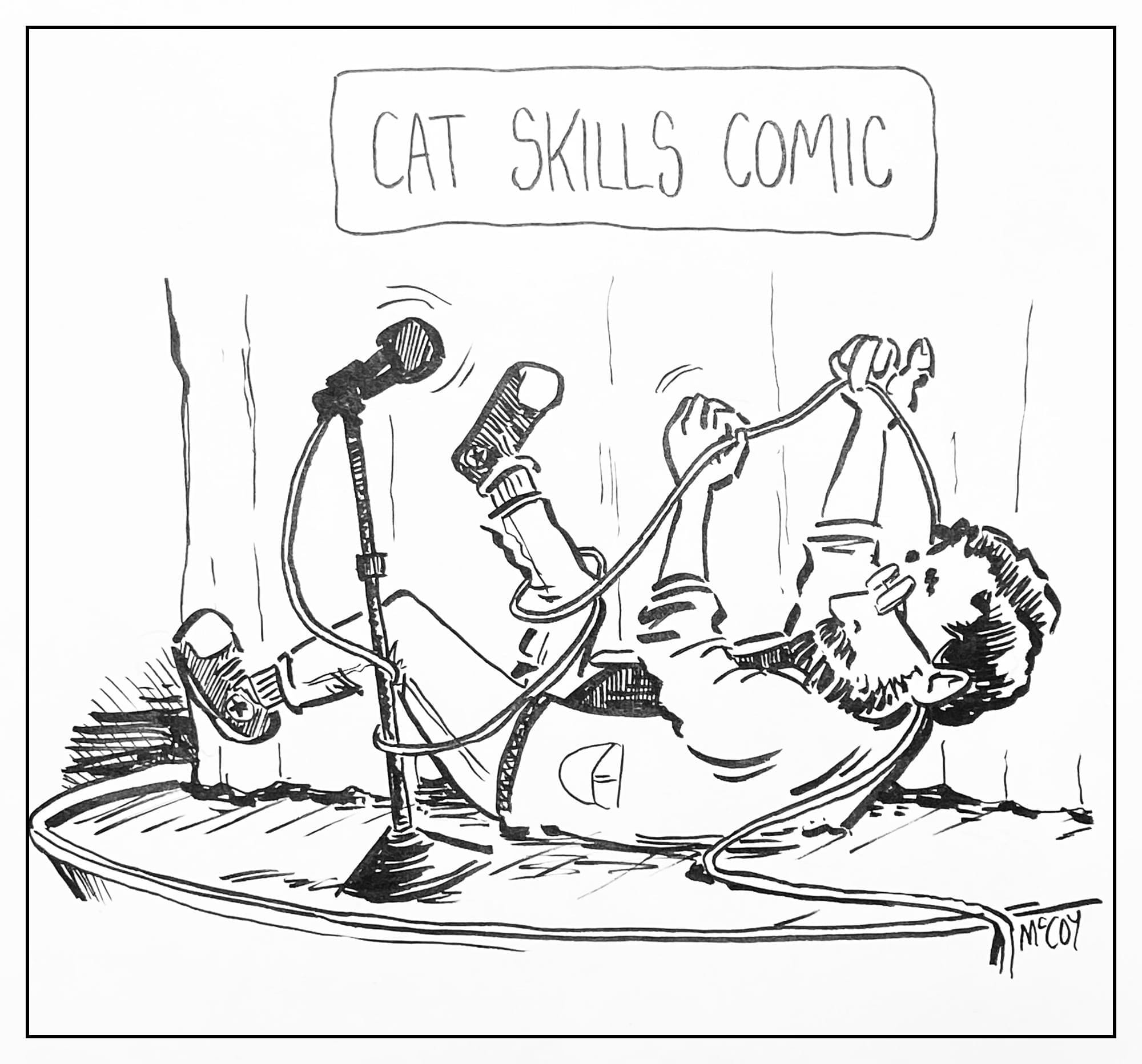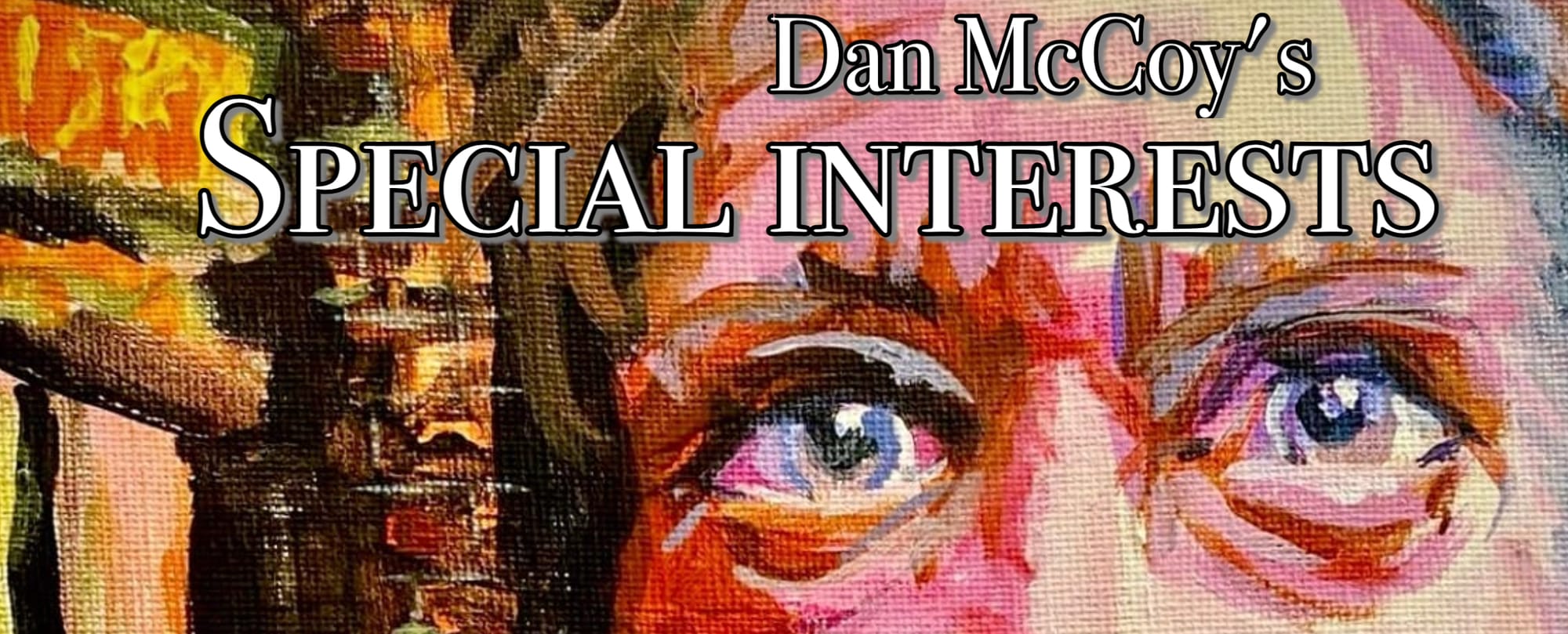But Doctor, I AM Danliacci

I started this newsletter by announcing that, in my mid 40’s, I was diagnosed with ADHD – news that was a shock to me.
I’ve returned to the topic occasionally, albeit less than one might expect from this newsletter's original framing as being about the intersection of pop culture and my neurodivergence. That's partly because I’ve realized that I feel better the less I allow it to define me, so I’m a little less chatty about it than I was when newly-diagnosed. Still, it can be helpful to admit that it does define you a little, because knowing that you really do have a harder time with some stuff helps you to forgive yourself when necessary.
That stuff's useful, but I'm not into hand-wringing over which elements of my personality are “me” and which elements are “ADHD” because both are me. It's not like the ADHD is happening over there in the corner of the room. I’m a guy whose brain falls within these certain parameters, and that's helped shape my personality. You think neurotypicals aren’t affected by THEIR specific body chemistry? In the words of the great philosopher Popeye, “I yam what I yam.”
I still can't help theorizing, though. Recently I was washing dishes, and – before I got started – I scanned the drying rack for absolutely everything that lived on the other side of the kitchen and loaded myself with pans and utensils, far beyond maximum occupancy, just to keep from making two trips across the room.
When I worked in an office, I used to think of stuff like this as “work smarter, not harder” – figure out the fastest route, then work your magic like the smart smart lazy smart smartie you are! Now I think this tendency may also have been my ADHD brain saying “boring boring BORING boring” and wanting to rush through my assignments so I could go browse the Internet at my desk and still be bored, but ON MY OWN TERMS, DAMN IT.
Anyway, I’ve been thinking about the origins of personality, and especially how public personas get constructed – because having a “persona” is such a huge part of comedy.
If you’re a comic, your whole currency is your point of view, and the value of having a specific point of view is the surprise and delight from an audience, when they hear your take and think “I never looked at it that way – but I totally get it” It's having a unique vision unearth a truth about the world, in a way that feels startling and unpredictable. Some comics just go for relatability without a unique POV – “we’re all thinking it, but I’m SAYING it." And, sure, folks have become popular this way, but (leaving aside the fact that maybe we’re not all thinking it, and you’re trying to launder something cruel or prejudiced through the acceptance of a crowd) the problem with “we’re all thinking it” is that – if we're all already thinking it? It's by definition hack. If ANYone could say it, then why do we need YOU?
Once a persona’s been established, and an audience feels they know you, a comedian can get laughs simply by playing to expectations. Jack Benny built his “cheapskate” comic persona so carefully on his radio and TV shows, that – whenever he was hit up for money – he could generate laughs just with a take and a pregnant pause. Likewise, when a Three Stooges short begins with a wealthy dowager putting a vase on a pedestal, proclaiming “I certainly hope these three cleaning men I hired do a good job before my society dinner tonight!” The audience isn't anticipating consummate professionalism. It's waiting to see how those Stooges fuck up that vase.
(I apologize for digging out some extremely old stuff to make my point, but classic comedy provides the clearest examples. Believe me, I wish I could make the same point with something young people are into, like Chappell Roan, or being prudish about sex in movies).
Once a comedy persona is set, it becomes highly portable – you can make a film plugging it into anything. This can be explicit, such as in the three Pee-Wee Herman films, where Paul Reubens is the same “Pee-Wee” no matter the varied context, or the various Muppet films where “continuity” doesn't exist – they’re just about Muppets doing shit, whether mounting a musical, solving a diamond theft, or bedeviling Ebenezer Scrooge. But I’m almost more interested in examples where the performers are meant to be “different characters” within the world of the films, while only ever really playing “themselves.” Groucho may call himself Geoffrey T. Spaulding, Rufus T. Firefly, Otis B. Driftwood, Hugo Z. Hackenbush, or any other ridiculous, middle-initialed name, but he’s always Groucho – dropping by to insult his hosts, grab any free hospitality on offer, and woo a dowager for her money.
If you had absolutely no context for Groucho, you’d laugh, but perhaps also wonder what this asshole’s deal is; but the carefully built "context" of his persona tells you everything you need to know (he’s Groucho). There’s an anecdote in Harpo Marx’s wonderful (albeit unfortunately full of fabulism) autobiography Harpo Speaks, where he talks about touring Russia, as one of the first American performers to be permitted to do so. Audiences would watch his comedy routine stone-faced. He bombed gig after gig... until his translator explained that Russians tended to be literal-minded, and needed to know WHY he was acting like a nut. Once the translator added a brief introduction, framing Harpo as a mental patient? Suddenly the Russians were in stitches. Meanwhile, Marx Brothers fans require a much simpler frame (he’s Harpo).
These performances work best when you’re aware of the meta-frame of an actor’s persona. In a lot of Jackie Chan's comic action films, he’s essentially playing the idea of "Jackie Chan." Why is this guy so amazing at martial arts? He’s Jackie Chan. That’s why. In Mr. Nice Guy, there’s no particular explanation for why TV chef fights so well he can beat up the mob. Sure, it's implied that he once considered being a cop, but the real answer is “he’s Jackie Chan.” Rumble in the Bronx gives even less explanation for his powers. His character just briefly mentions that he studied kung fu. This is more than enough justification, because the audience knows the real reason he can do Jackie Chan stuff is that he’s Jackie Chan.
Newer comedies are slightly less built around personas, but they’re still designed to type. Consider the SNL-alum films of the 90’s and 00’s, the old man typed, fully realizing that he was calling movies from 22-35 years ago “newer.”
For instance: Adam Sandler has dramatic range, but in comedies he mostly plays an innocent goofball given to eruptions of rage. Spade and Farley’s characters went by by different names in their pair of films, but were always the snarky talker and the sweet, slapstick energy-ball. In most of his straightforward comedies, Will Ferrell is all masculine bluster, covering an insecure child.
And look, it can be a trap to think that a performer’s choices say anything more about who they are as an artist beyond “this is the gig I could get.” Recently Audrey and I saw Nicole Scherzinger in the Broadway revival of Sunset Boulevard. She was by far the best thing about the production, but after the show we were reflecting about the stigma attached to someone like her doing theater, because she’s best known for being in The Pussycat Dolls. Which is weird, because it’s not like The Pussycat Dolls was the song of her soul and her highest artistic ambition. It was a gig she auditioned for. And even if it WAS her highest ambition, so what? That wouldn’t mean she couldn’t ALSO be good at musical theater, because she’s a professional, for pussycat’s sake.
But, while not all roles are personal, I do think comic personas tend to reflect something about the person behind the mask – whether they do so directly (Groucho WAS a caustic wit, while Chico was the reprobate and Harpo was the sweet one) or as a negative-image reflection (Will Farrell is reportedly a shy, sweet man, and it’s not too big a leap to wonder if his loud, pompous characters are his way to purge pent up energy, and express that side of his character, while his innate sweetness lets us love those characters anyway).
This personal connection is why I get a little frustrated when audiences complain “we’ve seen this before” from a comedian who makes “too many” movies “playing basically the same character.” Well, yeah. These characters are personal to them and their comedic strengths, often developed through years of trial and error, and bonded to them personally like Tom Hardy and an alien goo-monster. I can’t argue you out of being tired of something, but discarding the work of a lifetime is a tall order. Yes, artists evolve, but there’s more than a touch of “bored now, what else you got?” in this modern world where we’re bombarded by so much “content” that no singular piece of art carries the impact it once might.
Or maybe I’m just bitter. Showbiz is cruel. Comedy is cruel. I’ve had my successes, but – like many in our contracting entertainment business, where streaming “disruptions” and a splintered viewership have led to a world where people would prefer taking a tax write-off than making anything, and what does get made tends to be safe recyclings of old IP that satisfy no one – I sometimes feel left behind in my own career as a writer/comedian.
A little side-trip: I’ve always felt weird about defining myself as a “comedian,” because that word usually evokes a very specific performer: a stand-up comic. And that’s a corner of comedy I’ve only dabbled in, so it seems unfair to claim the title. Yet the discomfort is probably just a “me” problem. I wrote late night comedy for over a decade, and I have a podcast that’s essentially a couple of hours of improvised comic conversation a week, and I do associated stage shows and streaming events that involve straight-up comedy performance for live audiences. Still, I wear the “comedian” title like a pair of neon crocs – uncomfortably, with the conviction that everyone’s whispering about me.
But I’m enough of a comedian that even I have a persona, though it’s difficult to define. On my podcast, I’m me, but it’s more like I’m playing “me,” an amplified version of the parts of myself I know are funny – and to make a belated turn back toward where I began: I wonder how many of those comedy traits are tied directly to my ADHD.
For instance, I often take the “straight man” role – the long-suffering one, putting up with the shenanigans of my friends. As Elliott pointed out once, I’m like Bob Odenkirk (though obviously not as brilliant) in that he finds me funniest when I'm frustrated. Deep down, does that "comedy" frustration come from my very real ADHD-inspired feelings of being overwhelmed and beleaguered by life?
Other examples – I’ve been dubbed Pervazoid #1 on the podcast for my willingness to be honest about my own horniness – a thing I know feels funnier coming from a reserved guy like me. Now, I genuinely believe we should all be more open and honest about sexuality, as a huge part of human life, but also...? ADHD tends to make folks leap straight into the deep end of frankness (or oversharing, depending on your viewpoint). Also, there’s a certain addlebrained quality I have that I’ll lean into for a laugh, but… isn’t that just my ADHD spacy-forgetfulness, amplified for effect?
Most funny people have an understanding of what makes them funny, whether it’s Conan O’Brian leaning into his unique physical presence or your kooky Aunt Cheryl playing up her own flakiness for laughs. Dialing into your quirks is funny... but it can also flatten you as a whole human being, as other people start to believe your quirks are the wholeness of what defines you.
Then there's the problem with overstating your own flaws for comic effect. I believe wholeheartedly that a comedian should be willing to look foolish. I’ve encountered comedians in my time who insist on always projecting cool to the audience, and protecting their own "awesome" persona, and I can’t respect that. Comedy and vulnerability go hand in hand. But I know firsthand that too much self-deprecation starts to wear on the self that's getting deprecated.
Early in my podcast’s lifespan, I mused on air that I feared I was too boring. A lot of listeners took that – and my co-hosts’ willingness to make fun of me – as license for THEM to make fun of me as well… not realizing that it’s a lot different for me to say shit about myself, or to get ribbed a bit by my closest friends on air, than it is for internet strangers to insult me because they want to get in on the gag. It was hurtful, and I had to gently ask my co-hosts to be careful, and for listeners to lay off. Fortunately, they were both kind enough to comply.
I promise I’ll land this plane soon, since – for a newsletter expressly about comedy – it’s been low on “jokes” and high on “things I probably should just say to my therapist.” I just wanted to blurt out my thoughts on comedy and mental health, because they have such an odd and uneasy symbiotic relationship.
I don’t believe in the old saw that comedians are “sadder” or that you need to be sad to create funny things. I DO believe that a lot of people get into comedy because it’s an obvious defense mechanism for people who feel odd, or unloved, or like they see things about the world that other people aren’t noticing, and the disconnect is alienating for them. Comedy is a way to weaponize that disconnection into a connection. No matter what Patch Adams says, laughter is pretty shitty medicine, but it is a good way to get people to like you.
Or... so it seems.
You might start getting into comedy because you want that attention and connection, but the first part of a comedian's career is absolutely FILLED with indifference and hostility. No laughs. No attention. You have to make friends with failure. If you’re lucky, you DO become successful eventually, but by that time, you can’t believe the love you're finally getting is real. What’s more, you're dogged by the knowledge that your persona – the “you” getting presented to the world isn’t the same as the “you” inside your head – and belatedly realize that, while the affection of a crowd is great, the affection of just one person who really knows you well will always be better. Self-love’s pretty great too, if you can get there. (This isn’t a masturbation reference, although, hey. Don’t knock it.)
Watching comedy for mental health? Great stuff. A career in comedy for mental health? I wouldn't necessarily recommend it.
This has gotten bleak, so let me belatedly make a whiplash u-turn into sentiment, because – as is usually the case – dark thoughts are only half the story, and sadness is a lying liar who loves to lie to you. Here's the good stuff.
I got into comedy because I wanted to be surrounded by funny people and be a part of that world, and I’ve been blessed to have made so many hilarious friends. Comedy in general has introduced me to my share of phony careerists, but it’s introduced me to a far greater number of empathetic lovable weirdos, many of whom have helped me along the way for no greater reason than that someone helped THEM along the way (a philosophy I’ve done my best to pass on).
Meanwhile, I’m so grateful to have thought one day, “hey… maybe I should start a podcast.” Not just because it has sustained me during years when other work is lean, but because it’s connected me to so many people, in ways that ARE real – not only my two close friends who I get to laugh with every week, but thousands of listeners across the world who have written in or come to see us live, delivering praise or the occasional gentle critique, all of which has made me a kinder, more understanding person.
Most of all, there are the people who have gotten in touch to say we’ve somehow made a meaningful difference in their lives, just by always being there for them with our silly nonsense week after week. Folks who’ve found strength to go on because of the laughs or togetherness they've found in our show, just as I’ve found strength in any number of goofy, seemingly mindless things that bring me joy.
That’s some goddamn It’s a Wonderful Life shit, right there. And I’ll never be grateful enough for it. But I’ll do my best to try.
I usually don’t cross the streams too much on this newsletter, but since I organically drifted into the topic (seriously it was not originally planned to coincide) if you happen to listen to our podcast, The Flop House – it’s currently the Max Fun Drive: if you have the means, please consider supporting the show financially, so we can keep on making it for as long as people wanna hear it.

For earlier posts, check out the archive. In my other life, I’m a podcaster. Listen to my show The Flop House, here. In my other other life, I’m an Emmy-winning comedy writer. If you’re looking to staff, get in touch! And if you love the newsletter, you can always consider tipping me, by enrolling in the paid tier!
